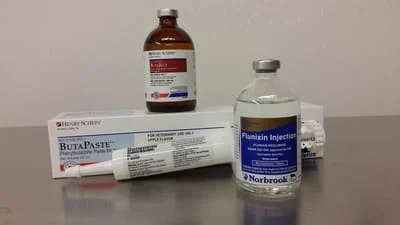Bute, Banamine and Equioxx: How Much is Too Much?
Dr. Jen Dulin, DVM MS DACVS-LA

First, let’s discuss a little background on what these medications are and how they work. These three meds are all non-steroidal anti-inflammatory drugs, or NSAIDs. NSAIDs work by disrupting the body’s production of pro-inflammatory mediators such as prostaglandins. Prostaglandins depend on specific enzymes, called cyclooxygenase (COX), for their production. NSAIDs inhibit the activity of COX enzymes, thereby reducing inflammation, pain and fever.
But wait, there’s more: there are two types of COX enzymes at play. COX-1 is produced in most tissues (i.e. GI tract and kidneys) and induces formation of protective prostaglandins. These constitutive prostaglandins mediate blood clotting and protect the GI tract and kidneys from damage. We’d prefer not to stop COX-1 from doing its thing; it’s quite important. COX-2 is produced in response to injury and tissue damage, resulting in pain, inflammation and fever. COX-2 inhibition is responsible for the reduction in pain and inflammation we seek when giving NSAIDs to our horses for arthritis, colic, etc.
Unfortunately, drugs such as Bute and Banamine are considered “non-selective” and inhibit both the good/constitutive and the bad/inducible prostaglandins by blocking both COX-1 and COX-2. In healthy horses, with no underlying GI tract or kidney disease, dehydration, or sensitivity to NSAIDs, there are typically minimal to no side effects when using an appropriate dose of these drugs. However, serious side effects such as gastric and hind-gut ulceration, protein-loss, kidney dysfunction or failure, and even death can occur if horses have risk factors or the drug is used inappropriately. These risks are severely amplified when the drug is given too frequently, the dose is too high, or when more than one NSAID are used at the same time.
There is such a thing as too much of a good thing. More is not always better. You can lead a horse to water, but you can’t make him drink enough to prevent side effects from too much Bute. Insert your bad cliché here!
Firocoxib is a “selective,” coxib-class NSAID that preferentially inhibits COX-2. Because of this, adverse side effects are significantly decreased, and it may be safer for your horse if he or she requires long-term administration.
There are manufacturer recommendations, based on safety and efficacy studies, for appropriate doses of Bute, Banamine, and Equioxx. However, each horse’s individual situation may require modification of the recommended dose, based on his or her own risk factors. We highly recommend that horse owners consult with their friendly neighborhood veterinarians prior to giving their horses any NSAIDs. Here are the take-home points:
- Do not give more than the veterinarian-recommended amount of any NSAID.
- Do not give any NSAID more frequently than instructed. Keep this in mind for colics: if giving one dose of Banamine does not decrease your horse’s pain, giving two doses won’t either and it may cause unwanted and potentially severe side effects.
- NEVER give more than one NSAID at the same time. Bute and Banamine work the same way, and giving both together is like doubling the dose. Problem is, doubling the dose won’t necessarily lead to better pain relief, but it will often add to your horse’s health problems.
- Consider talking to your veterinarian about firocoxib, or topical NSAIDs with less systemic effects like Surpass (diclofenac), if your horse requires long-term administration.
We all want to do what’s best for the horses in our lives, which includes safely reducing their pain and inflammation. Just remember, an apple a day keeps the doctor away… but too much NSAID and you’ll see the vet instead.
